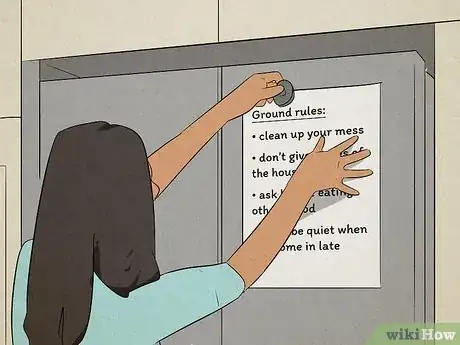This article was co-authored by Eze Sanchez and by wikiHow staff writer, Hannah Madden. Eze Sanchez is a Life & Relationship Coach and the Founder of Eze Sanchez Coaching in Gainesville, Florida. He's been practicing as a coach since late 2016 and has more than 1,000 hours of collective training and experience in personal development. He specializes in helping people find self-acceptance, self-empathy, and self-love through building accountability and kindness for themselves. Eze has an Associates Degree in Mechanical Engineering from the University of Central Florida, a diploma in Massage Therapy from the Florida School of Massage, and a certificate from the Satvatove Institute School of Transformative Coaching.
This article has been viewed 19,797 times.
Does your roommate eat your food, borrow your stuff without asking, or leave dirty dishes in the sink for weeks? Living with an inconsiderate roommate might make you feel frustrated, but don’t worry—by having an open, honest talk with them, you can find a solution and make your house a home again. Read through our article to learn everything you need to know about talking to your roommate and resolving your issues together.
Steps
Talk to your roommate now instead of waiting.
-
Tackling the problem now will keep it from festering in the background. It might seem easier to ignore your roommate problems for now, but actually, it’s better to face these things head-on. Ask your roommate to sit down and have a chat with you soon, or schedule a house meeting a few days in advance.[1] X Research source
- Try to pick a quiet, stress-free time to talk with your roommate. An evening when you two are relaxing together is probably fine, but if your roommate is stressed or busy, save it until later.
Explain what the problem is without accusing them.
-
Avoiding accusations will help you have a more productive conversation. Bring up whatever’s bothering you delicately—you can be specific, but try not to attack or berate your roommate. That way, you two can have an open, honest discussion, rather than an argument.[2] X Research source
- Try using “I” language to bring the focus back on yourself. For instance, you might say, “When the house is noisy at night, I feel stressed because I can’t sleep.”
- “When the kitchen is dirty for days on end, I get frustrated because I have no room to cook.”
Listen to your roommate.
-
Give them time to talk so they don’t feel attacked. Once you’ve said your piece about your living situation, take a step back and really listen to your roommate’s point of view. Try not to interrupt, and validate their feelings about the situation so they feel heard.[3] X Research source
- If your roommate gets defensive or angry, try saying something like, “I understand you’re upset, but I’d really like us to make some changes so that I feel comfortable here.”
- Or, “Thanks for sharing your perspective. I’d still love it if we could talk about potential solutions, though.”
Come up with a solution together.
-
If you both make the rules, your roommate is more likely to follow them. After you've both shared your issues, do some brainstorming together on what could change around your place. Keep an open mind and be willing to compromise so that everyone ends up happier.[4] X Research source
- “Maybe instead of throwing parties every weekend, we could limit them to once a month. Does that sound fair?”
- “It might be helpful if we made a chore chart to track everything that gets done around the house. What do you think about that?”
- “It’s fine if you borrow my stuff, but I’d appreciate it if you asked first. Could you check in with me before you use anything of mine?”
Establish some ground rules.
-
Ground rules clearly define what is (and isn’t) okay in your home. No matter how long you’ve been living together, it’s never too late to get some rules around your place. As you chat with your roommate, make some basic guidelines that you can both follow to make your home safe and comfortable.[5] X Research source Your house rules might look something like:
- If you make a mess, you clean it up.
- Don’t give copies of the house key to anyone who doesn’t live here.
- If you want to eat the other person’s food, ask first.
- If you’re going to be home late, try to be quiet when you come in.
Make a cleaning schedule.
-
Cleaning schedules ensure that all the chores get done. If you’re struggling to get your roommate to clean up after themselves, consider making a cleaning schedule and posting it somewhere in a common area. Write down who’s going to clean what part of the space and when it should be done.[6] X Research source
- Talk about who wants to do which chores, too. If you hate mopping the floors but your roommate doesn’t mind it, maybe they could mop while you clean the bathtub.
- If your roommate is hesitant, remind them that a cleaning chart benefits them, too. “I know a cleaning schedule seems a little juvenile, but that way, we’ll remember whose turn it is to do the dishes instead of arguing about it.”
Talk about when visitors can come over.
-
Set boundaries so you don’t feel imposed upon in your own home. Maybe you’re fine with your roommate having people over, but you want them to be a little quieter when they’re here. Or, maybe you’re fine with your roommate having their partner over sometimes, but not every single day. Chat with your roommate about guests, and try to follow the same rules with your own visitors, too.[7] X Research source
- “It’s fine to invite your friends over, but I’d appreciate it if you kept it down when I’m trying to sleep.”
- “I’m sure it’s nice having your boyfriend here, but maybe you two could spend time at his house for a couple days a week?”
Set a “lights out” time.
-
Having a quiet period helps you both sleep peacefully. If your roommate tends to be noisy while you’re trying to get some rest, this rule might be necessary. Set a reasonable time period when noise levels should be kept to a minimum that you both follow.[8] X Research source
- “During the week, could we try to keep things quiet by 11 PM?”
- “Maybe we could try to hang out in our rooms by midnight on weeknights. That way, we can both get some sleep.”
Write up a roommate agreement.
-
Putting things in writing helps you both stick to the plan. Plus, it will make each rule clear so there’s no miscommunication. Once you’ve both agreed on some basic guidelines, write them out and keep them in a common area so you can refer to them whenever you need to.[9] X Research source
- Having a roommate agreement also prevents any deniability later on. Your roommate can’t say “We never agreed to that,” if there’s a sheet of paper in the living room that says otherwise.
Check in with your roommate often.
-
See if they’re okay with the rules to make sure they’re still happy. Once you’ve both been following the new rules for a little while, check in with your roommate to see if they’re still okay with them. And, if your roommate ever pushes your boundaries or forgets a rule, feel free to have a chat with them about it.[10] X Research source
- “Just checking in about the cleaning schedule. I know you’ve had a busy week, but would you be able to do the dishes soon since it’s your turn?”
- “I noticed that you borrowed my hair dryer this morning. In the future, could you ask me first, like we talked about?”
- “How are you feeling about the ‘no visitors on weeknights’ rule? Is it still working for you?”
Spend time elsewhere if you can.
-
If your home isn’t a sanctuary, find somewhere else that is. Unfortunately, roommates aren’t perfect, and you may find that you need to head elsewhere to get some peace and quiet. Try going to the library, heading to a friend’s house, or spending time outdoors when your home becomes a little too much to handle.[11] X Research source
- Remember that roommates are temporary! You won’t be stuck in this situation forever.
Start looking for a new place if nothing changes.
-
Picking a new place gets you away from your inconsiderate roommate. If you’ve talked with your roommate a few times and tried to come up with solutions but nothing is working, unfortunately, it’s unlikely that they’re going to put in the effort anytime soon. Try looking for other places you can move to once your lease is up to feel happy and comfortable in your home.[12] X Research source
Expert Q&A
-
QuestionWhat are signs of an inconsiderate roommate?
 Eze SanchezEze Sanchez is a Life & Relationship Coach and the Founder of Eze Sanchez Coaching in Gainesville, Florida. He's been practicing as a coach since late 2016 and has more than 1,000 hours of collective training and experience in personal development. He specializes in helping people find self-acceptance, self-empathy, and self-love through building accountability and kindness for themselves. Eze has an Associates Degree in Mechanical Engineering from the University of Central Florida, a diploma in Massage Therapy from the Florida School of Massage, and a certificate from the Satvatove Institute School of Transformative Coaching.
Eze SanchezEze Sanchez is a Life & Relationship Coach and the Founder of Eze Sanchez Coaching in Gainesville, Florida. He's been practicing as a coach since late 2016 and has more than 1,000 hours of collective training and experience in personal development. He specializes in helping people find self-acceptance, self-empathy, and self-love through building accountability and kindness for themselves. Eze has an Associates Degree in Mechanical Engineering from the University of Central Florida, a diploma in Massage Therapy from the Florida School of Massage, and a certificate from the Satvatove Institute School of Transformative Coaching.
Life & Relationship Coach A major sign of an inconsiderate roommate is someone who doesn't take your boundaries into account after you've expressed them.
A major sign of an inconsiderate roommate is someone who doesn't take your boundaries into account after you've expressed them.
You Might Also Like
 50+ Ways to Wish Someone a Bright Future & Good Luck
50+ Ways to Wish Someone a Bright Future & Good Luck
 How to Answer “How’s It Going?” in Any Situation
How to Answer “How’s It Going?” in Any Situation


 How to Roast People: Finding Joke Ideas, Crafting Punchlines & More
How to Roast People: Finding Joke Ideas, Crafting Punchlines & More
 What He Thinks When You Don't Contact Him
What He Thinks When You Don't Contact Him



 How to Manifest Love with a Specific Person
How to Manifest Love with a Specific Person


 What to Say When Someone Has a Family Emergency
What to Say When Someone Has a Family Emergency
 How to Expose a Gaslighter and Prove that You’re Being Gaslit
How to Expose a Gaslighter and Prove that You’re Being Gaslit
References
- ↑ https://www.umass.edu/living/sites/default/files/documents/roommate_brochure_2011.pdf
- ↑ https://www.cosmopolitan.com/uk/worklife/campus/a30782/what-to-do-noisy-housemates/
- ↑ https://mhanational.org/how-deal-roommate-problems
- ↑ https://www.umass.edu/living/sites/default/files/documents/roommate_brochure_2011.pdf
- ↑ https://www.thekitchn.com/5-more-tips-for-blissfully-sharing-a-kitchen-with-roommates-tips-from-the-kitchn-207635
- ↑ https://mhanational.org/how-deal-roommate-problems
- ↑ https://www.architecturaldigest.com/story/roommate-probems-your-roommates-boyfriend
- ↑ https://mhanational.org/how-deal-roommate-problems
- ↑ https://www.architecturaldigest.com/story/roommate-probems-your-roommates-boyfriend
About This Article

























































